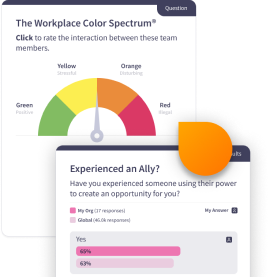
Spot and De-escalate Workplace Disputes Like a Pro
Course Video Preview
Example of a conflict between a co-workerLike it or not, some degree of conflict is part of the human condition - and a part of every workplace environment. Effective conflict resolution management training reduces distraction, increases performance and gives employees confidence that their concerns will be heard, taken seriously, and fairly addressed. This Conflict and Resolution training course presents productive ways to manage workplace conflict. Managers will be provided with five easy-to-remember steps for recognizing and managing workplace conflict.
Course Description
In this conflict resolution skills training course, learners will also see how to prevent or de-escalate unhealthy conflict before it leads to more serious problems. Managers will learn how to stop, evaluate, and consider all sides of a conflict before reacting. This conflict resolution training course also covers key communication skills needed to address workplace conflict. Interactive polling questions in the conflict resolution training course give employers real insight into how employees feel about the concepts and culture skills presented. Emtrain’s innovative Ask the Expert feature gives learners direct access to course experts.
Key Concepts- Step 1: How to take a moment after conflict occurs.
- Step 2: How to think through a conflict rather than just reacting.
- Step 3: How to share and be open with the other person in the conflict.
- Step 4: How to follow through in resolving conflict.
- Step 5: How and when to ask for help in resolving conflicts.
Course Features
- Access to our Anonymous Ask the Expert tool
- Rich video scenarios based on real-world events
- Built-in employee sentiment surveys
- 50+ Machine Translation Options
- Optional program timer
- Policy acknowledgement tool
- Extensive customization options

Lessons
Working Through Work Conflicts
Step 1: Take A Moment
Step 2: Think It Through
Step 3: Share and Be Open
Step 4: Follow Through
Step 5: How to Ask for Help
Moving Forward
Post-Program Survey
Relevant Courses
Complementary Microlessons
Recommended Resources
From ‘Ask the Expert’
Emtrain’s Ask the Expert feature enables users to ask questions about compliance, bias, harassment, and diversity & inclusion as they come up. It’s all confidential, and answers are sent straight to their inbox. View some of the example questions below and see the Experts answers.


